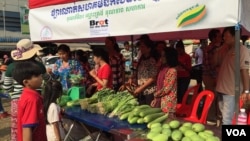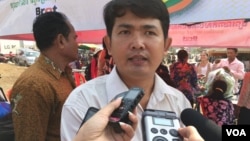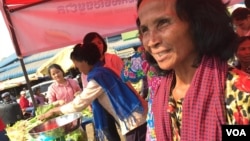At a public market in Kampong Speu Province, west of the Cambodian capital, Phnom Penh, a stall selling organic vegetables attracts dozens of housewives and passersby. Many stop to buy the locally grown vegetables, which are here thanks to a new program established by the Cambodian Center for Study and Development in Agriculture (CEDAC).
The goal is to promote organic products locally and to cater to a growing base of consumers who want to eat healthier. For buyers like Sok Srey Oun, 30, that also means supporting local farmers.
Locally grown, organic vegetables are not sprayed with chemicals to survive long transports, and they taste better too, she says. Prices stay competitive, and local farmers improve their income.
"Now that we’re just selling the vegetables right after cultivation; the quality is ensured," she said.
Some say they experience nausea or fatigue from contaminated vegetables; some blame that on vegetables that are imported from neighboring countries. An estimated 50 percent of produce consumed in Cambodia is not grown in the country. Of locally grown produce, only about 5 percent is organic, CEDAC says.
Organic standards
The new stall in Kampong Speu is meant to help provide access to local, clean produce, which can improve health and prevent disease. CEDAC is putting similar markets in the provinces of Tbaung Khmom, Kompong Thom, Siem Reap, Kompong Cham and Prey Veng. It runs eight such markets in Phnom Penh.
CEDAC coordinator Ung Vuthy says many Cambodians who now seek out organic products understand the health benefits, which represents a change from years past.
"I believe that from one day to another, there will be more people coming," he said.
Meanwhile, agricultural experts are trying to establish standards for organic products in order to prevent fraud. Kiem Makarady, director of CEDAC’s environment and health department, tells VOA Khmer that non-government organizations in agriculture are working together to create standards for organic cultivation and markets, which could lead to a national policy.
Pursuing feasibility
"We are trying to form a model that says organic products are feasible in Cambodia, for farmers to make gains, as well as consumers, in terms of food safety," he said. "Thus, civil society should endorse the standards and support production of safe food. This will also help policymakers have a better understanding."
Hean Vanhorn, deputy director general of the Ministry of Agriculture’s general department of agriculture, said the agency’s officials are working on a standard already, alongside other ASEAN officials. Certification by non-governmental groups does not have government endorsement, he added.
The government budget provides $46 million to the Ministry of Agriculture to enhance growth in the agricultural sector, and, according to the Supreme National Economic Council, the ministry expects to spend $20 million on rice and vegetable cultivation between 2016 and 2018.
But these initiatives come at a difficult time for farmers, some of whom are experiencing water shortages and drought. Vegetable farmer Ton Son, who works in Kampong Speu’s Samroang Tong district, said she hopes the government will help build a reservoir to hold more water.
"If there’s sufficient water, we can cultivate organic vegetables well, from one year to another," she said.
This report was produced in collaboration with VOA's Khmer Service.










